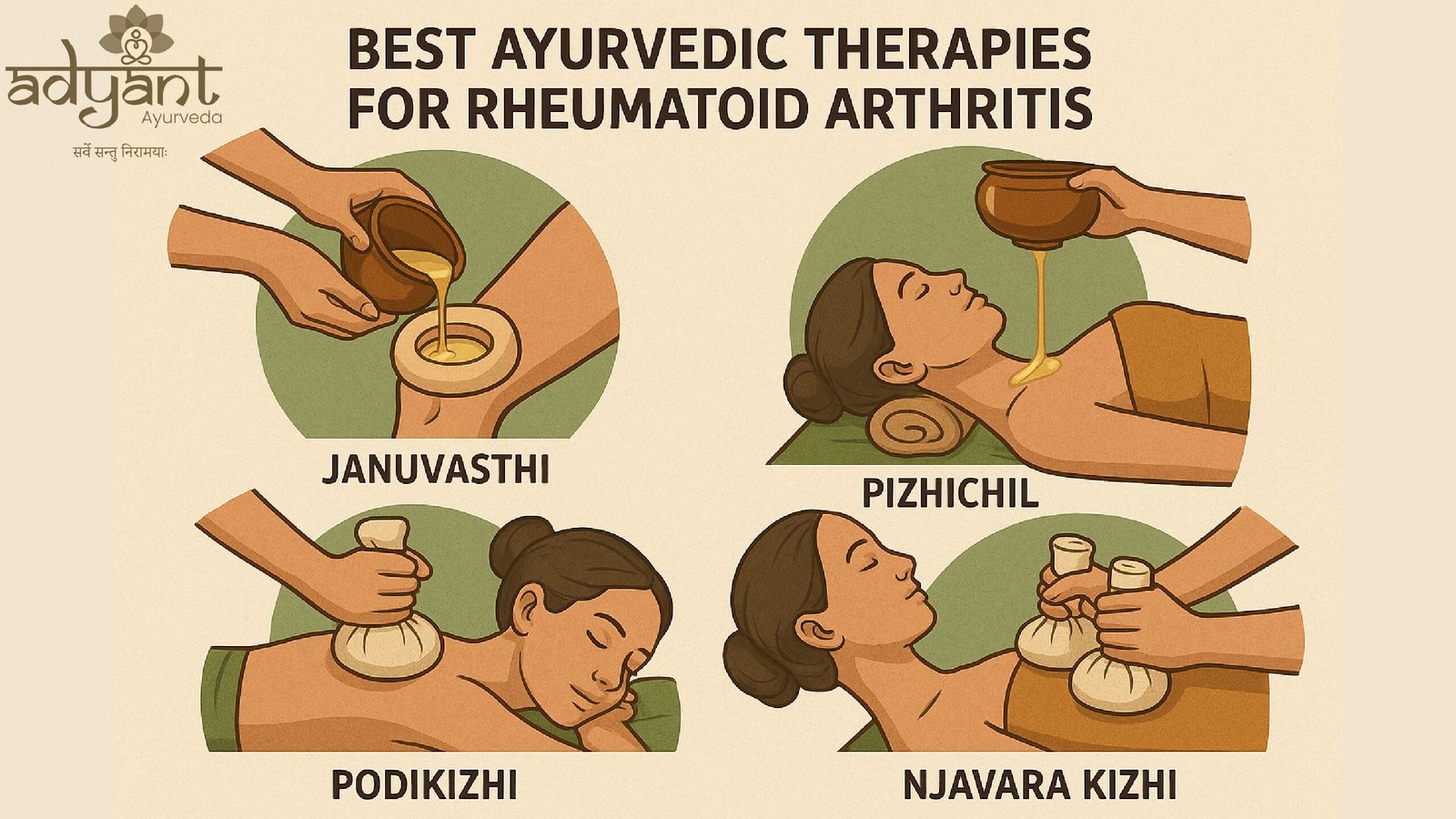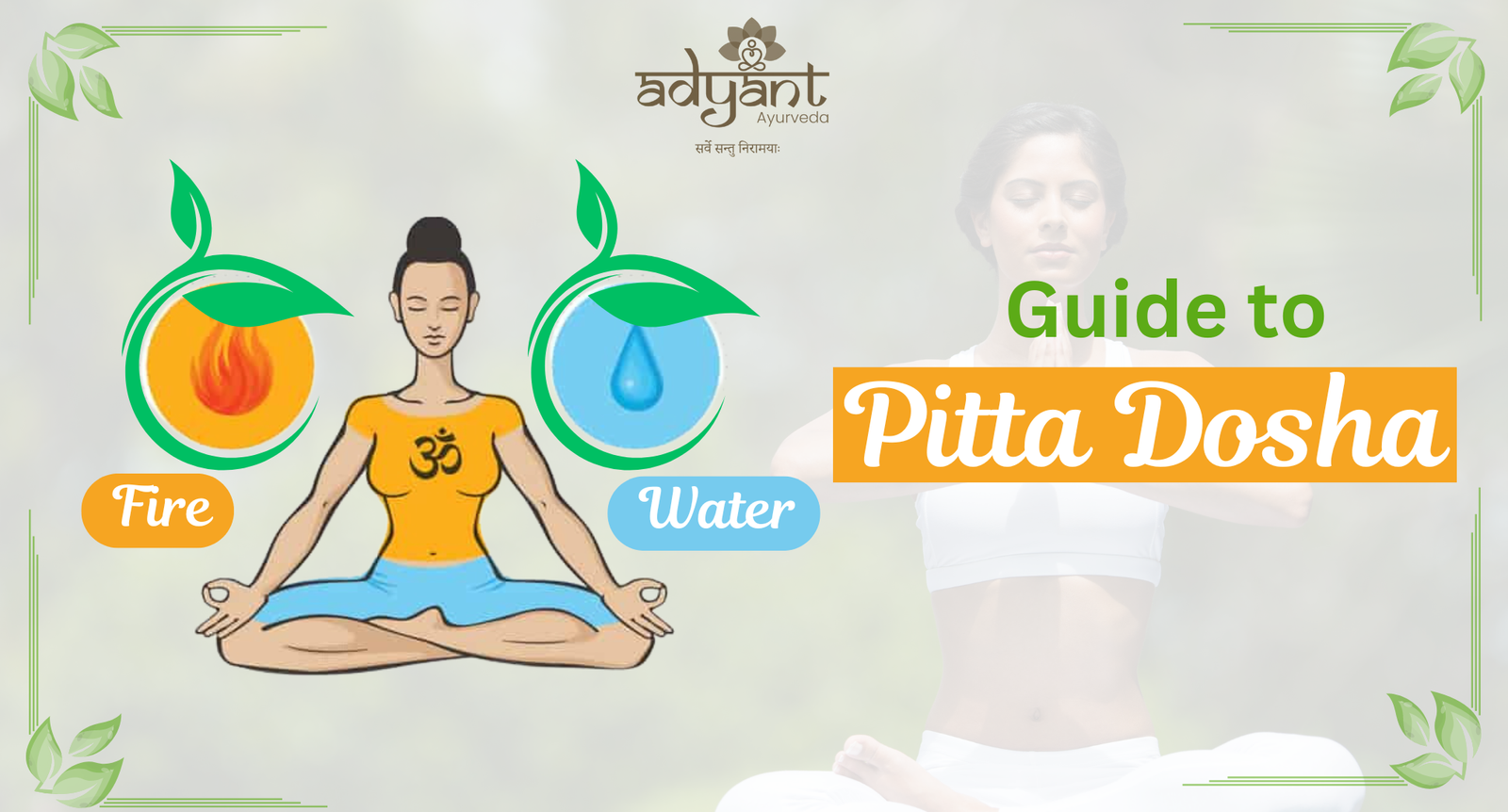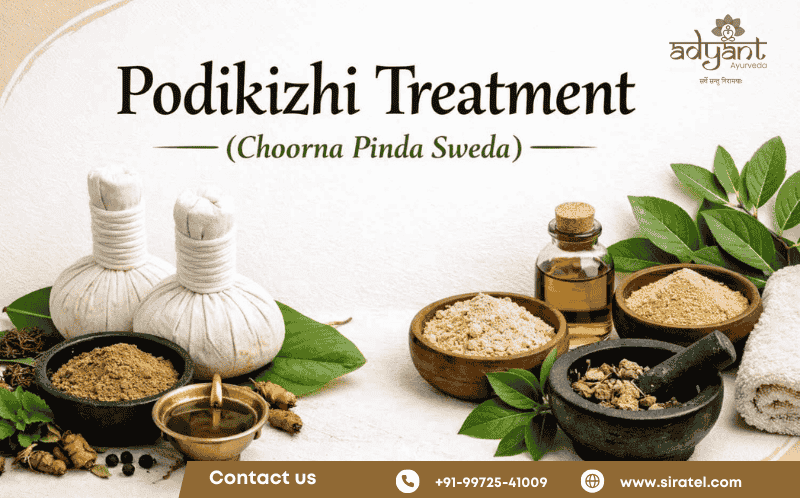Table of Contents
ToggleAyurvedic Treatment for Rheumatoid Arthritis (Amavata)
Best Ayurvedic Treatment for Rheumatoid Arthritis (RA) in Bangalore: Rheumatoid Arthritis (RA), known as Amavata in Ayurveda, is a chronic autoimmune disorder characterized by inflammation of joints, pain, stiffness, and swelling. Ayurveda views this condition through the lens of Ama (toxins) and vitiated Vata dosha.
What is Amavata in Ayurveda?
Amavata is a compound word:
- “Ama” refers to the undigested or improperly digested metabolic waste that accumulates due to impaired Agni (digestive fire).
- “Vata” denotes the vitiated Vata dosha, which transports the Ama to joints, leading to inflammation and pain.
Nidana (Causes) of Amavata
- Intake of incompatible, heavy, and oily foods
- Day sleep after meals
- Sedentary lifestyle
- Indigestion and weak digestive fire
Samprapti (Pathogenesis)
- Weak digestion and formation of Ama
- Ama circulates in the body with Vata
- Ama gets lodged in joints, causes stiffness, swelling, and pain
Diagnostic Techniques in Ayurveda for Amavata
In addition to Nadi Pariksha and symptom observation, Ayurvedic diagnosis includes:
Roga and Rogi Bala Pariksha – Assessing disease strength and patient vitality
Dashavidha Pariksha – Ten-fold examination including Prakriti (constitution), Vikriti (imbalance), and Ojas (immunity)
Trividha Pariksha – Darshana (inspection), Sparshana (palpation), and Prashna (interrogation)
These help determine the stage of Amavata and personalize the treatment.
Differentiation from Other Joint Disorders
Sandhigata Vata (Osteoarthritis): Age-related wear and tear; pain worsens with use.
Vatarakta (Gout): Sudden, severe pain often in the big toe; related to Rakta vitiation.
Amavata (RA): Autoimmune, symmetrical joint inflammation with systemic symptoms.
Symptoms of Amavata
- Joint pain and stiffness (especially in the morning)
- Swelling in joints
- Loss of appetite
- Fatigue and lethargy
- Indigestion
- Fever in some cases
Ayurvedic Understanding of Rheumatoid Arthritis
According to Ayurveda, Amavata results from accumulation of Ama in the joints due to impaired digestion. The disease is Kapha-Vata dominant in the initial stage and becomes Vata dominant in the chronic stage.
Role of Agni in Prevention and Management
Since Mandagni (weak digestion) is the root cause, maintaining Jatharagni (digestive fire) is key to both prevention and relapse management.
Use of Deepana-Pachana herbs like Trikatu, Pippali, and Shunthi to rekindle Agni
Regular consumption of warm water and herbal teas to prevent Ama formation
Types of Amavata:
While Ayurveda doesn’t explicitly categorize Amavata into types like modern medicine does, the disease progression and chronicity allow us to understand its different stages:
- Nava Amavata (Acute Phase):
- Severe pain, stiffness, swelling, indigestion, heaviness
- Fever and poor appetite are commonly seen
- Gata Vata Stage (Chronic Phase):
- Persistent joint deformities
- Loss of function and degeneration
These stages help determine treatment protocols — more Langhana and Deepana in acute stages, and Brimhana and Rasayana in chronic.
Ayurvedic Treatment Approach to Rheumatoid Arthritis (Amavata)
Ayurveda emphasizes balancing Agni, removing Ama, pacifying Vata, and restoring joint health.
1. Shodhana Chikitsa (Panchakarma – Detoxification)
Detoxifying the body through Panchakarma therapies:
- Snehana (Oleation) – External and internal oil application
- Swedana (Sudation) – Fomentation therapy
- Virechana (Purgation) – Removes Ama from the GI tract
- Basti (Enema Therapy) – The most effective treatment for Vata disorders
- Kashaya Basti, Anuvasana Basti
2. Shamana Chikitsa (Palliative Treatment)
Herbs and formulations that digest Ama, reduce inflammation, and pacify Vata.
Ayurvedic Medicines for Rheumatoid Arthritis (Amavata):
- Simhanada Guggulu
- Detoxifying & anti-inflammatory
- Especially effective in removing Ama and calming joint pain
- Yogaraja Guggulu
- Balances Vata and Kapha
- Strengthens joints and reduces stiffness
- Rasna Saptaka Kashaya
- Effective in reducing inflammation and swelling
- Ashwagandha (Withania somnifera)
- Adaptogen, reduces stress, inflammation, and fatigue
- Sidh Makardhwaj
- Rejuvenator and immunity booster
- Should be taken only under supervision
These medicines are customized as per individual Prakriti and disease stage by Ayurvedic physicians.
3. Rasayana Chikitsa (Rejuvenation)
Once the acute condition is managed, Rasayana helps in improving immunity and joint strength:
- Ashwagandha
- Guduchi
- Shunthi
- Bala
Post-Panchakarma Rehabilitation & Supportive Therapies
After Shodhana (cleansing), Ayurveda prescribes:
Samsarjana Krama – A graduated diet plan to restore Agni
Yoga Basti – Rejuvenative bastis post-detox
Ayurvedic external therpies like Abhyangam (if needed) – Gentle joint mobilization
Home Remedies for Joint Pain in Rheumatoid Arthritis
These natural remedies support Ayurvedic treatment:
- Fenugreek Seeds (Methi)
- Soak 1 tsp overnight, consume in morning
- Reduces swelling and pain
- Castor Oil
- 1 tsp with warm water at bedtime for mild purgation
- Helps reduce Ama and Vata
- Turmeric + Ginger Tea
- Anti-inflammatory, boosts digestion
- Garlic Cloves
- 1–2 cloves daily on empty stomach
- Strengthens immunity
- Hot Fomentation with Rock Salt (Saindhava)
- Relieves stiffness and pain
- Ajwain (Carom Seeds) Water
- Boil 1 tsp in water and sip warm
- Improves digestion and relieves joint discomfort
- Massage with Mahanarayan Taila / Dhanwantharam Taila
- Reduces pain and strengthens joints
Diet and Lifestyle Recommendations
Pathya (Favorable)
- Warm, light, easily digestible food
- Mung dal, rice gruel, vegetable soups
- Ginger, turmeric, garlic, cumin
- Lukewarm water
Apathya (Avoidable)
- Heavy, oily, fried, fermented foods
- Curd, paneer, red meat
- Cold water and beverages
- Daytime sleep and sedentary habits
Yoga and Exercise
- Gentle stretches
- Surya Namaskar (as tolerated)
- Pranayama for stress relief
Ayurvedic Herbs with Modern Evidence for RA
These herbs are traditionally used and now increasingly validated by modern research:
Shunthi (Dry Ginger) – Anti-inflammatory, digestive stimulant
Guduchi (Tinospora cordifolia) – Immunomodulatory, antioxidant
Ashwagandha (Withania somnifera) – Adaptogen, reduces cortisol, joint pain
Haridra (Turmeric/Curcumin) – Potent anti-inflammatory & antioxidant
Guggulu (Commiphora mukul) – Anti-arthritic, detoxifying, lipid-lowering
Studies show Curcumin and Ashwagandha significantly reduce joint swelling, ESR, and improve grip strength in RA patients.
Preventive Measures to Avoid RA Flare-ups
After remission, maintenance is crucial to prevent recurrence.
Do’s
Follow a warm, light, Vata-Kapha balancing diet
Regular gentle exercise and Abhyanga
Seasonal Panchakarma (especially Basti)
Manage stress and ensure good sleep
Herbal support with Guduchi, Ashwagandha
Don’ts
Suppress natural urges (e.g., sneezing, gas, urine)
Eat heavy, oily, incompatible foods
Eat during indigestion
Exposure to cold and damp environments
Ayurveda vs Allopathy: A Comparative View
| Criteria | Allopathy | Ayurveda |
|---|---|---|
| Relief Speed | Fast (NSAIDs, steroids) | Gradual but lasting |
| Side Effects | Common (gastritis, weight gain, immune suppression) | Minimal when prescribed right |
| Root Cause Focus | No | Yes (Agni, Ama, Vata) |
| Long-Term Relief | Low without continuous meds | High with detox and Rasayana |
| Joint Preservation | Limited | Emphasis on Rasayana & rejuvenation |
| Cost | Recurring and high | Cost-effective over time |
Patient Testimonials & Case Studies
“After 3 months of Panchakarma and Ayurvedic medicines at Adyant Ayurveda, I’ve stopped my steroids and regained flexibility in my hands.”
– Ms. Lakshmi Rao, 48, Bangalore
“My ESR and CRP dropped drastically after 2 Basti cycles and Rasayana therapy under Dr. Shree Lakshmi at Jayanagar branch.”
– Mr. Ramesh K., 55
Research-Backed Insights
- Ayurvedic Regimen Study: Clinical trials support the use of composite Ayurvedic treatment in reducing symptoms of RA (JMIR Research Protocols).
- Ashwagandha & Sidh Makardhwaj Study: Improvement in joint swelling and pain confirmed in an RCT (IJMR, LWW Journals)
Why Choose Adyant Ayurveda for RA Treatment?
- 25+ Years of Expertise in Ayurveda and Panchakarma treatments
- Panchakarma & Ayurvedic Doctors across 4 branches in Bangalore
- Personalized treatment plans with medicines, therapies & diet
- In-house pharmacy & online consultation support
Branches: Jayanagar | Indiranagar | Kalyan Nagar | RR Nagar
Call: 9972541009
Visit www.adyantayurveda.com to book your appointment from the comfort of your own home.
Start your healing journey with Ayurveda and take the first step toward pain-free living.
Key Takeaways
Amavata = Ama + Vata Treat with detox, digestion, and joint nourishment.
Panchakarma like Basti and Virechana are highly effective.
Diet, herbs, and stress reduction are essential pillars.
Timely intervention prevents joint deformities.
Consult an Ayurvedic doctor for personalized protocols.
Conclusion: Healing Amavata with Ayurveda – A Journey to Lasting Relief
Rheumatoid Arthritis, or Amavata, is more than just joint pain — it’s a systemic imbalance rooted in poor digestion and toxin accumulation. Ayurveda offers a holistic, time-tested approach that addresses not just the symptoms but the very origin of disease. With therapies like Panchakarma, individualized herbal protocols, diet, lifestyle correction, and Rasayana, you can regain mobility, reduce dependency on chemical medications, and improve your quality of life.
At Adyant Ayurveda, our expert team empowers you with personalized healing that aligns with your body constitution and disease stage. Begin your journey toward joint freedom and renewed vitality—naturally and sustainably.
FAQs – Ayurvedic Treatment for Rheumatoid Arthritis in Bangalore
Can Ayurveda completely cure Rheumatoid Arthritis (RA)?
Ayurveda focuses on addressing the root cause—removing Ama and balancing Vata dosha. While “complete cure” depends on disease stage and chronicity, long-term remission and sustained symptom relief are very much achievable.
How does Ayurveda diagnose RA differently from modern medicine?
Ayurveda uses tools like Nadi Pariksha, Agni Bala, Dosha-Dushya-Vikruti analysis, and symptom mapping. It detects Amavata (RA) even in early or preclinical stages—before joint deformities occur.
What is Amavata?
Amavata is the Ayurvedic equivalent of Rheumatoid Arthritis. It is caused by Mandagni (weak digestion), leading to Ama (toxins) accumulation and Vata aggravation, which together obstruct the Srotas (channels) and lodge in the joints.
Which Panchakarma therapies are most effective for RA?
- Basti: Core therapy for Vata balancing and Ama removal
- Virechana: Removes inflammatory Pitta and toxins
- Abhyanga + Swedana: Relieves stiffness and pain
- Janu Basti: For chronic knee issues
- Raktamokshana: Used selectively for severe inflammation
Are Ayurvedic treatments safe for long-term use?
Yes. When administered under expert guidance, Ayurvedic therapies and medicines are safe, natural, and free from harmful side effects.
How soon can I expect relief from Ayurvedic treatment?
Acute RA: 2–4 weeks
Chronic RA: 2–3 months or longer
Outcomes depend on disease stage, adherence to treatment, and dietary discipline.
Can I continue allopathy while taking Ayurvedic treatment?
Yes. Ayurveda complements modern medicine. Over time, steroid and NSAID dependency often reduces under Ayurvedic supervision.
What are the best Ayurvedic medicines for RA?
Common formulations include:
- Simhanada Guggulu
- Kaishora Guggulu
- Yograj Guggulu
- Amavatari Rasa
- Rasnasaptaka Kashaya
Dosage should always be customized by a qualified Ayurvedic physician.
Are there any side effects of Ayurvedic treatment?
Minimal to none when done correctly. Some mild detox effects like increased bowel movements may occur during Panchakarma but are temporary and therapeutic.
Is Panchakarma necessary for everyone with RA?
Not always. It depends on the chronicity, dosha dominance, and presence of Ama. Panchakarma is especially effective in moderate to severe cases.
What dietary habits should RA patients follow?
Follow a Vata-pacifying and Ama-reducing diet:
- Favor: warm soups, ghee, cooked vegetables, herbal teas
- Avoid: curd, sugar, nightshades, fried/processed food, incompatible combinations
Which lifestyle changes help support Ayurvedic treatment for RA?
- Daily oil massage (Abhyanga)
- Gentle yoga and Pranayama
- Regular sleep and stress management
- Avoid cold exposure and overexertion
How does Rasayana therapy help in RA?
Rasayana herbs like Ashwagandha, Amalaki, Bala, and Guduchi rejuvenate tissues, boost immunity, prevent relapse, and support recovery after detox.
Is Ayurveda effective for deformities or long-standing RA?
While Ayurveda may not reverse joint deformities, it significantly reduces pain, prevents progression, improves flexibility, and enhances quality of life.
Where can I get authentic Ayurvedic RA treatment in Bangalore?
Adyant Ayurveda offers specialized RA treatments at its centers in Jayanagar, Indiranagar, Kalyan Nagar, and RR Nagar. Consult with expert doctors for customized Panchakarma and herbal protocols.









